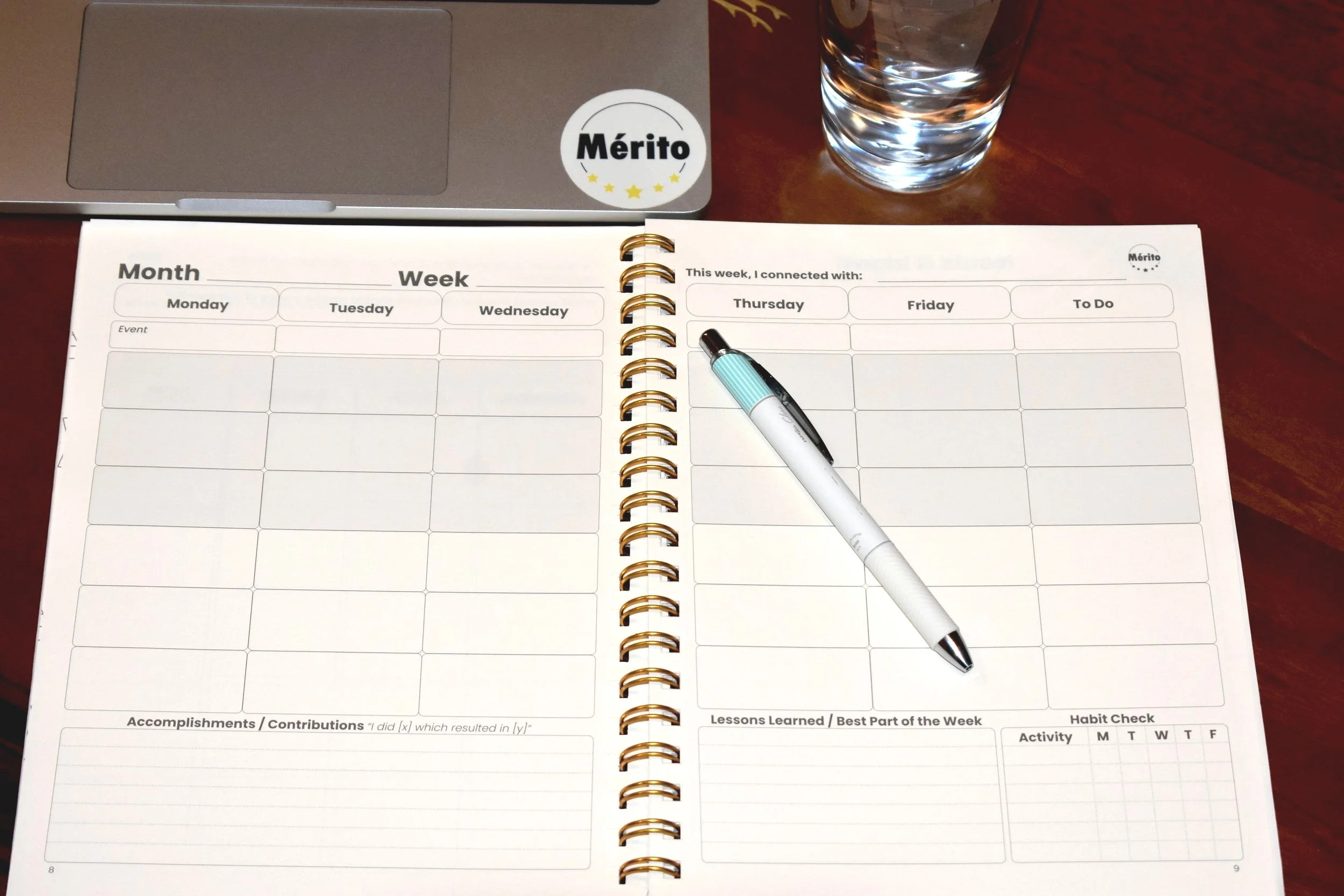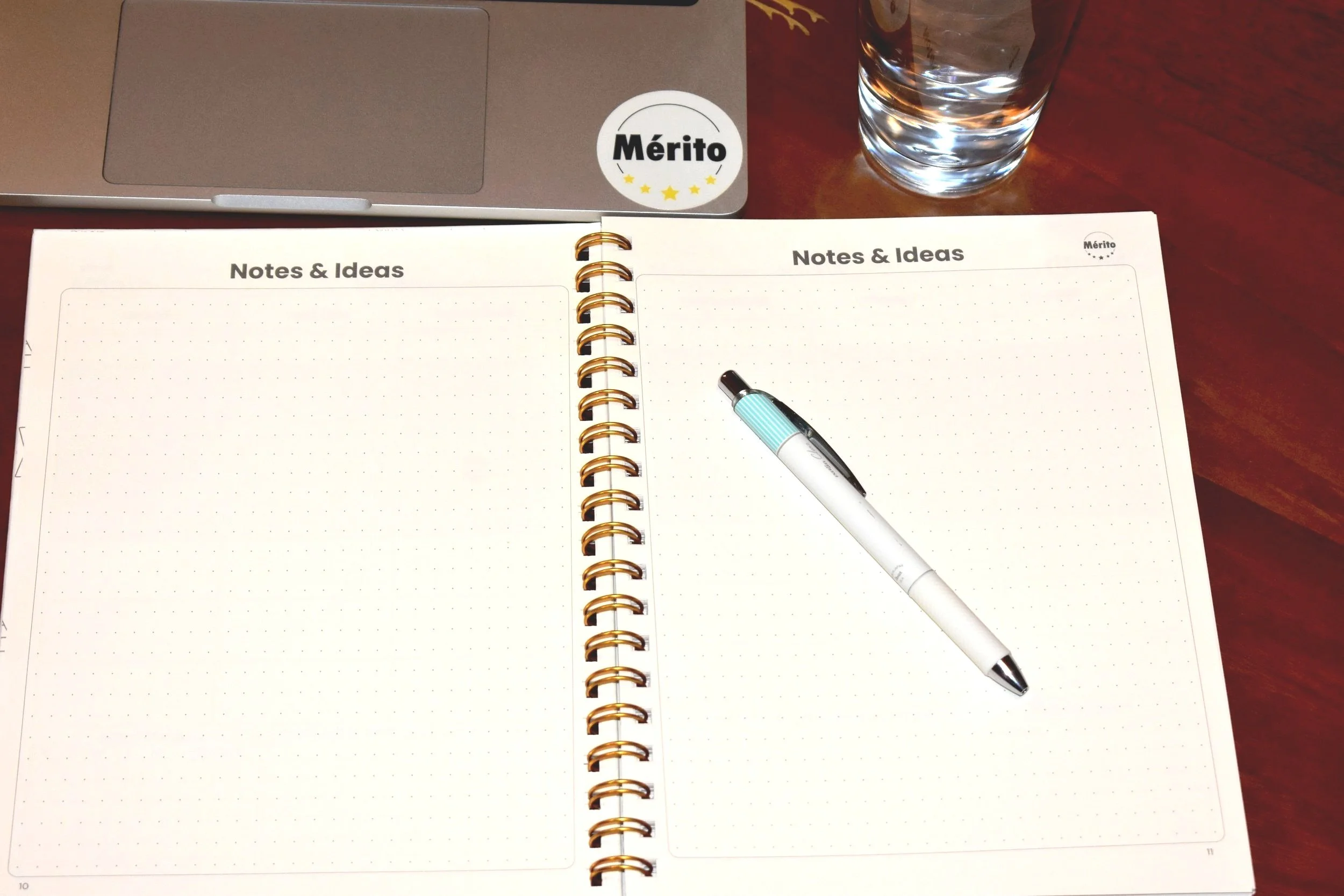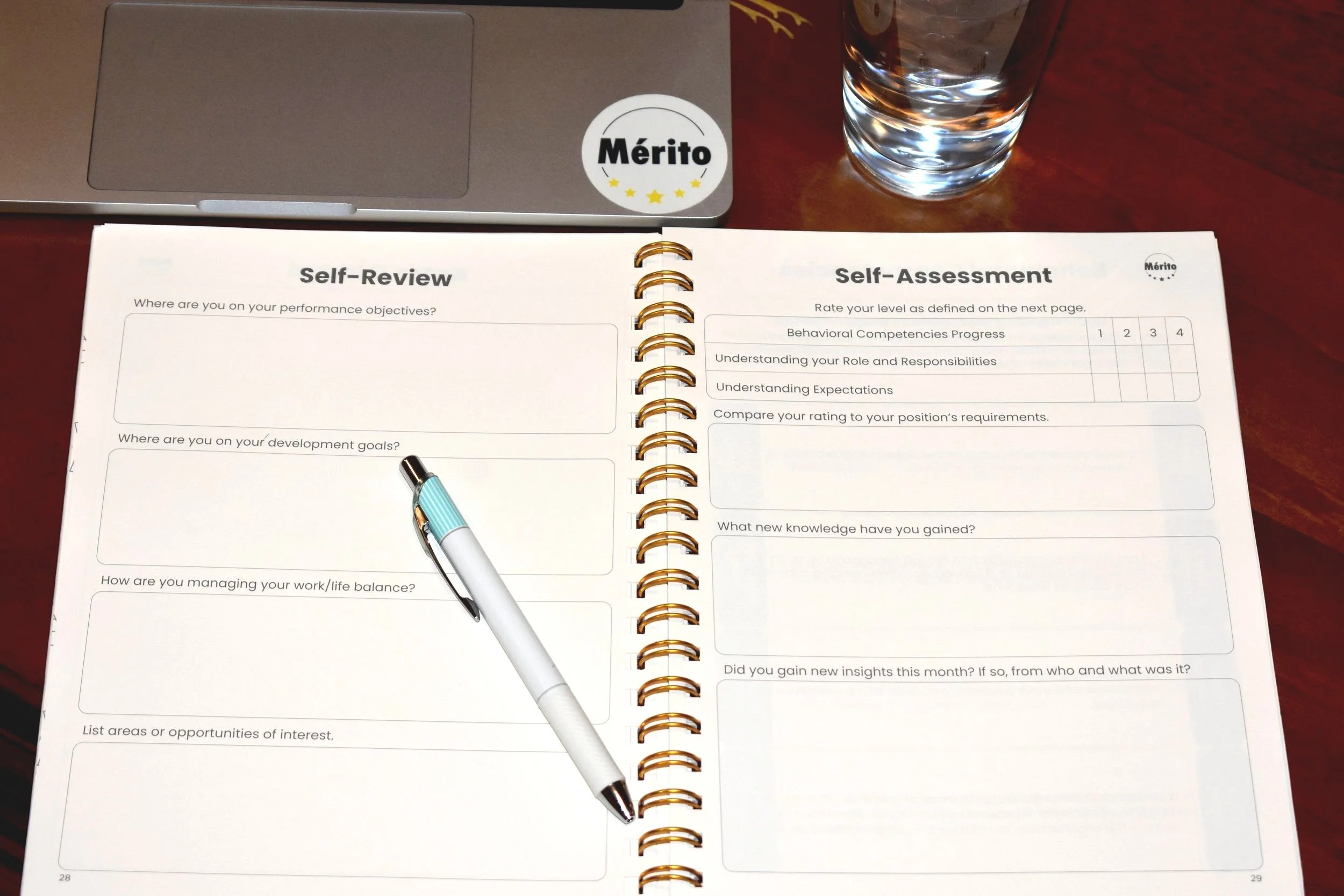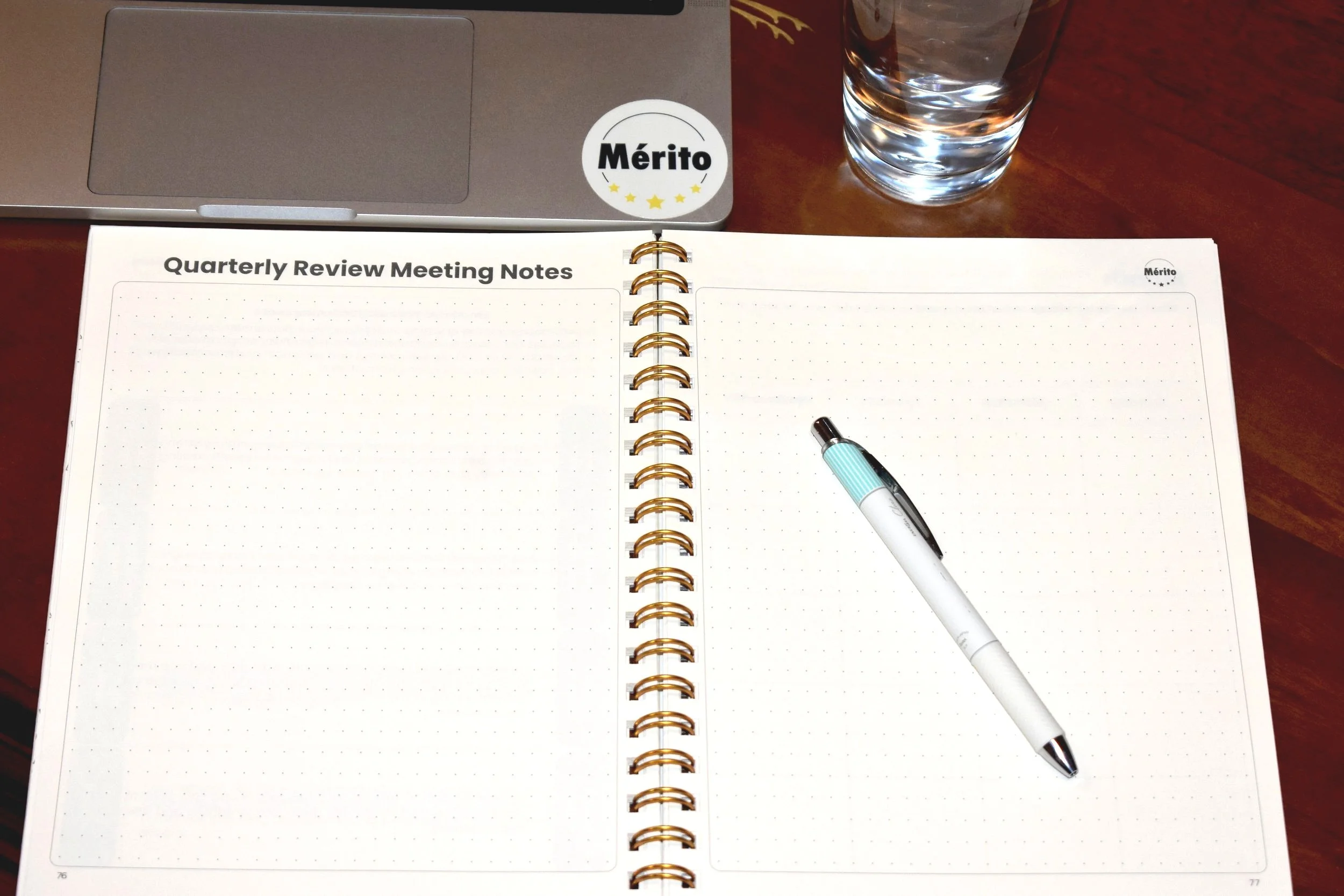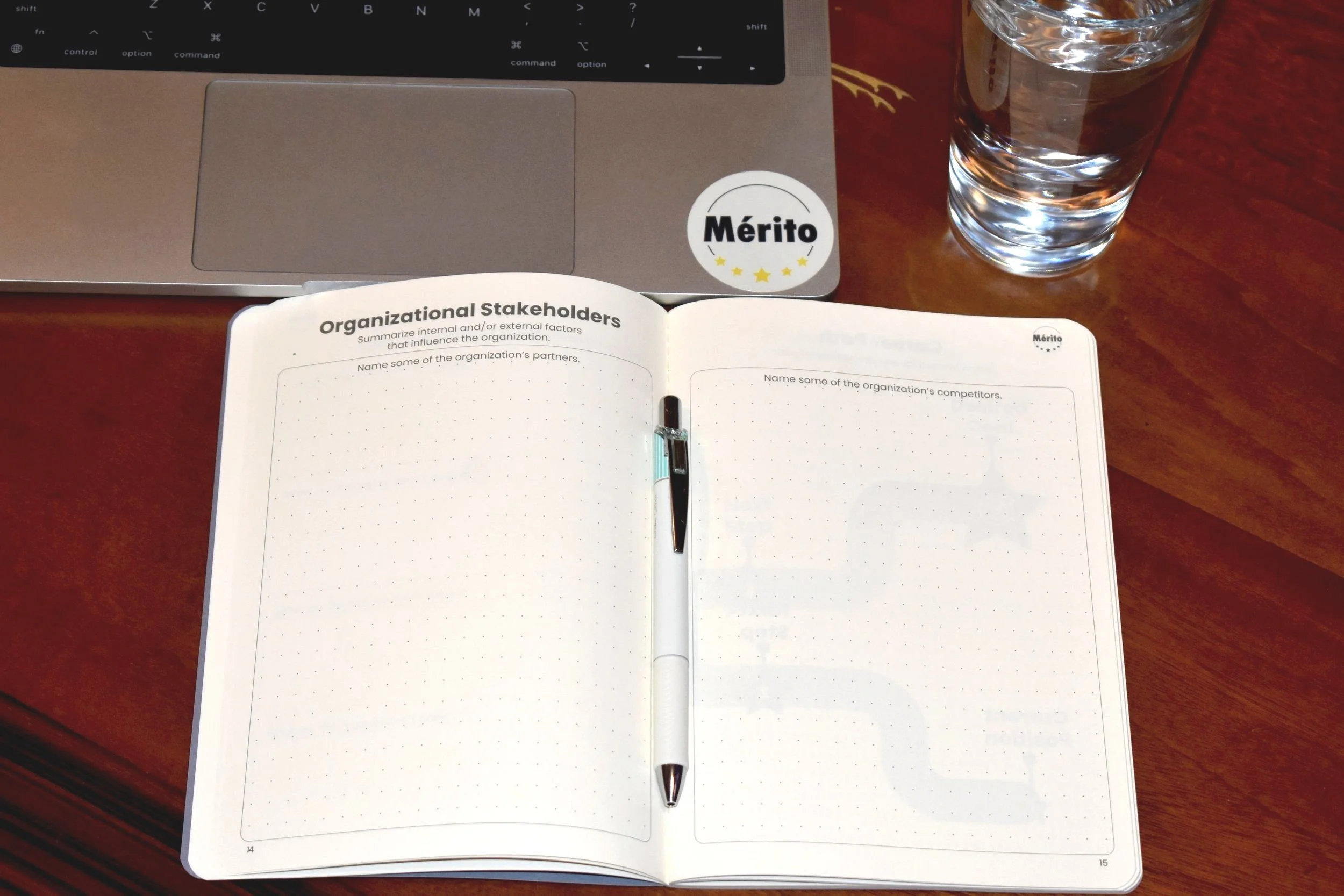
Learn how Mérito can put “Professional growth in your hands!”
We believe in your merit!
The Mérito Mindset Professional Development Journal was developed to provide professionals with a tool to put professional growth in their hands!
We understand the need for work/life balance, yet staying professionally organized is sometimes an afterthought. Work can be overwhelming, making it challenging to articulate accomplishments, knowledge, skills, and abilities. With a Mérito Mindset Professional Development Journal, you convert an afterthought into a forethought. It is designed and organized to help you plan, execute, and track your performance and development.
Our journal understands the work environment, which makes a Mérito Mindset journal exceptionally different from any other journal. Since you are already aware of your goals and objectives, your focus should be on identifying accomplishments, knowledge, skills, and abilities throughout your performance cycle and articulating your contributions to the organization’s success during your performance review.
The Mérito Mindset Professional Development Journal and Organizational Guide are your tools for holistic professional development. It encompasses leadership and human resource concepts and practices for professional growth and success.
Check out our pages below to learn how our journal is explicitly designed to put…
Professional growth in your hands!
Professional Development Journal
First of its kind!
An undated, all-inclusive Professional Development Journal helps you navigate and grow within your career while shining a light on your accomplishments, knowledge, skills, and abilities.
The layout is practical and functional; keeping it undated means you can use it when you start a new job, transition into a new position, or start a performance cycle.
It is divided into two six-month journals; the first six months will prepare you for your mid-year evaluation, and the latter six months will prepare you for the year-end evaluation period.
This is your brag-book of accomplishments, knowledge, skills, and abilities!
Performance Objectives & Development Plan
Manage your performance!
The Performance Objectives are the action items from your Position Responsibilities section in the Organizational Guide.
Summarizing your goals for the upcoming six months will help you stay focused and keep your performance goals in sight. This will allow you to prioritize your tasks or projects to meet your objectives.
Execute your development goals!
The Development Plan is the action item from the Development Goals in the Organizational Guide.
It helps you plan and outline virtual, in-person, on-the-job, or self-paced training and development opportunities you plan to execute.
Weekly Layout
Change your mindset!
The Weekly Calendar pages have a blank weekly format so that you can determine your methodology for staying organized. We suggest you use the Ivy Lee Method, whereby the shaded areas prioritize your top three tasks or projects out of six.
The Weekly Calendar page also focuses on building new network connections, outlining Accomplishments/Contributions, Lessons Learned/Best Part of the Week, and tracking your work Habits.
Notes & Ideas
Perfectly organized!
The Notes & Ideas pages follow the Weekly Calendar pages. Your meeting notes or ideas are perfectly organized to the date they occurred.
Self-Review & Self-Assessment
Stay ready!
The Self-Review page is the monthly review page. It’s your moment to reflect and articulate your progression or need for assistance with your performance, development, work/life balance, or areas of interest.
Enhance your skills!
The Self-Assessment page allows you to gauge your behavioral competencies (soft skills). This is an excellent time to assess your need for assistance, journal positive feedback, and articulate your thoughts before speaking with your supervisor.
Speak with confidence!
These pages are revisited every six months to prepare for your mid-year and year-end performance reviews. The goal is to remove the “cringe” factor during your performance review discussions. Instead of trying to remember your accomplishments, it’s all in one place, ready for you to excel in your performance reviews.
Don’t second guess your skills!
Soft skills, also known as Behavioral Competencies, are knowledge, skills, abilities, and attitudes. They define the skills a professional must demonstrate to carry out a task, activity, or function successfully.
These behavioral competencies, derived from Bloom's Taxonomy, provide a significant advantage when attempting to understand who you are, how you work, and what you aspire to in your career.
Each year will bring new challenges and a new state of mind. Your professional maturity will develop naturally when you routinely conduct a self-assessment.
Behavioral Competencies
Quarterly Notes
It’s all in one place!
The Mérito Mindset Professional Development is the only journal you will need for a successful career.
You can prepare for your performance review by keeping notes of your accomplishments, feedback, and assessments, in addition to taking notes during your quarterly and annual reviews.
Organizational Guide
More than a notebook!
The Organizational Guide is the Professional Development Journal's sidekick notebook. It fits easily into the planner's back pocket and focuses on developing internal and external organizational awareness.
Individuals with this keen understanding can prioritize, strategize, and represent the organization. Organizational awareness sometimes takes up to ten years to develop; we believe you can acquire this knowledge in under five years.
Position Responsibilities
Work with clarity!
Summarize your job description so you can refer to it periodically to help prioritize tasks.
Each job responsibility should be allocated a percentage of time. The percentages should add up to 100% and represent the estimated time of each responsibility over an entire performance cycle.
Department Information
Outline your resources!
Department information comprises five key elements: functions within your department and organization, key coworkers, and technical skills and resources needed to accomplish your responsibilities.
Summarizing this information assists with articulating your role within your department and at the organizational level.
Find your place and aim higher!
While an organizational chart identifies the top people and who reports to whom, we want to change your mindset about succession planning.
Identify your current place within the organization and the position you would like to achieve. Focus on the role rather than the individual.
Then, find a sponsor and express your interest when the organization works on succession planning.
Organizational Chart
Organizational Culture
Become a representative!
Focus on internalizing the organization’s mission, goals, values, and beliefs. These are more than just words; they influence behaviors within the organization.
We also added a writing space for unwritten rules, which we know is a bit of a contradiction by itself, but the point is to note behaviors and processes you wouldn’t find written down.
Organizational Stakeholders
Keep your eyes and ears open!
Stakeholders are often referred to as stockholders or top-level board members. Instead, shift your mindset and increase your awareness of the organization's surroundings internally and externally.
Aim to focus on what’s happening beyond your work within the organization and see what other factors or stakeholders impact your work or the organization.
Career Path
Plan your future!
The idea of a career path is best when written down. Visualize and plan your desired career path by tracking the steps from your current position to your desired goal.
Set a goal for development!
After visualizing and noting your career path, it’s time to outline your development goals. Ideally, you would work with your supervisor to outline the knowledge and skills that need to be developed for the following position.
If possible, obtain a copy of your desired position job description (or vacancy announcements) to help you see what areas need development. Start by setting short—and long-term goals. This will help keep you on track to reaching your goals.
Development Goals & Professional Reflection
Remember the purpose!
Professional Reflection is where you draft your intentions positively and affirmatively and, most importantly, assume success!
Reflect on your values and how it connects with your professional development. List words of affirmation to remind you of your skills and abilities. And list people and situations in which you are grateful.
Remember, you don’t succeed by chance; you have the knowledge, skills, abilities, and attitudes that have helped you grow professionally.
Take control of your career growth!
Everything you need to enhance your performance and professional development is within your grasp; you only need two journals and an organizational guide, and you’ll have Professional growth in your hands!
Find your favorite journals!




